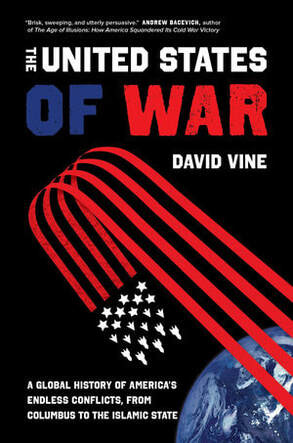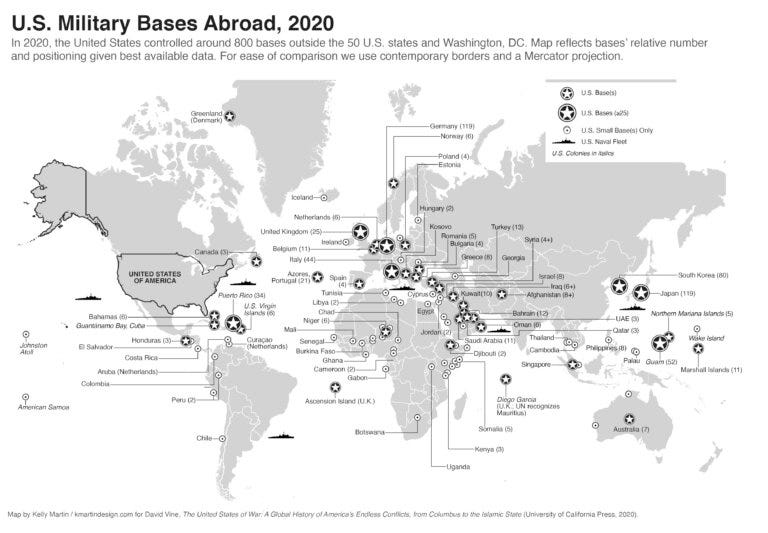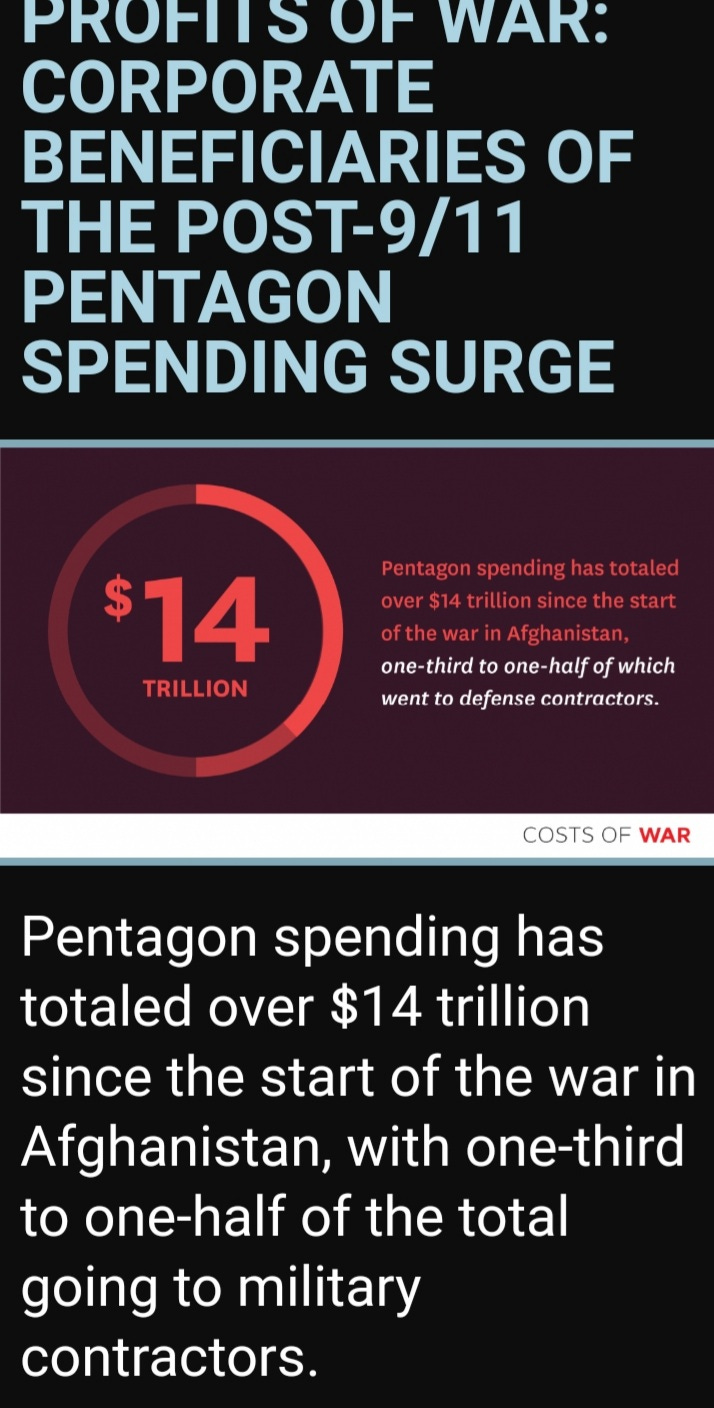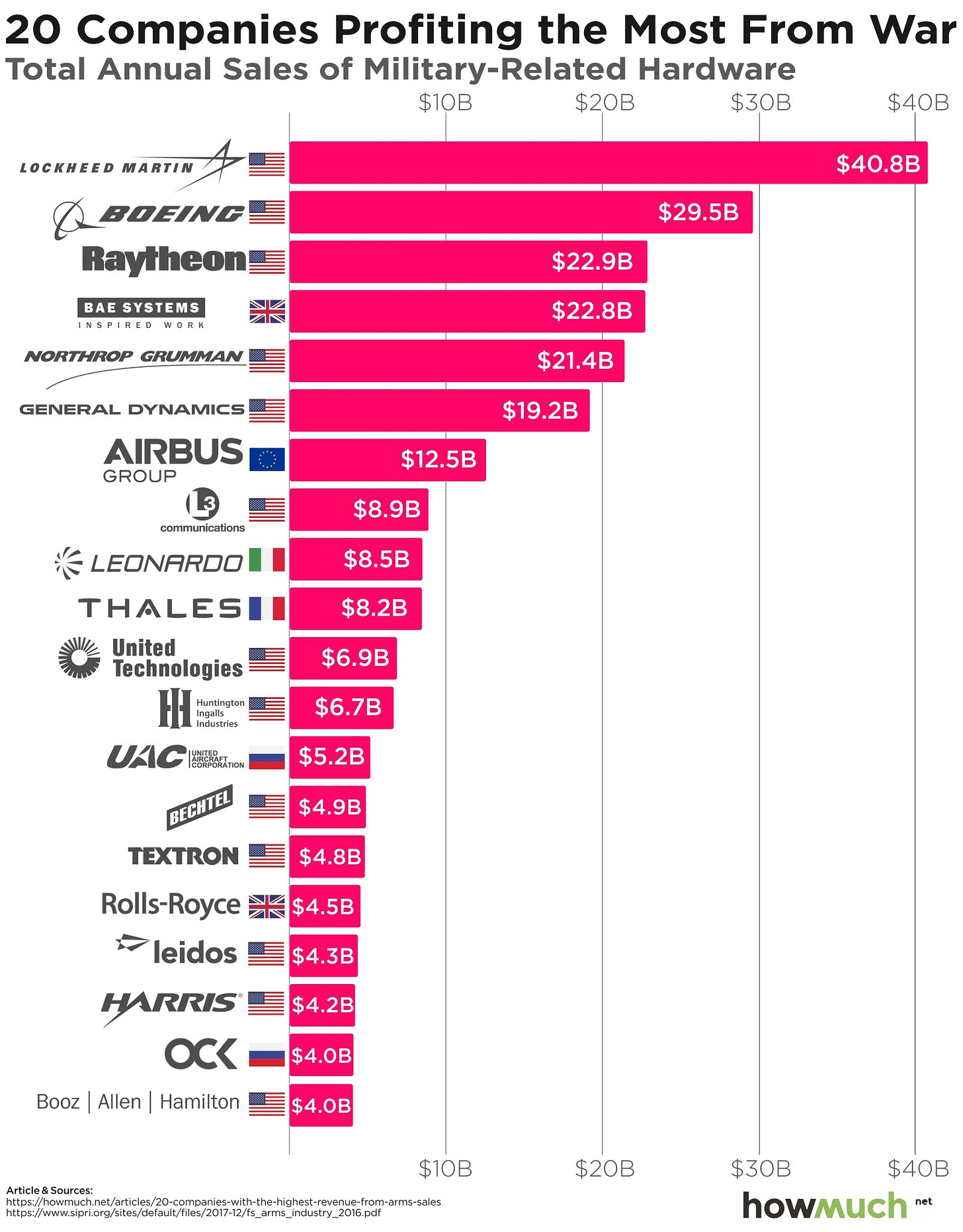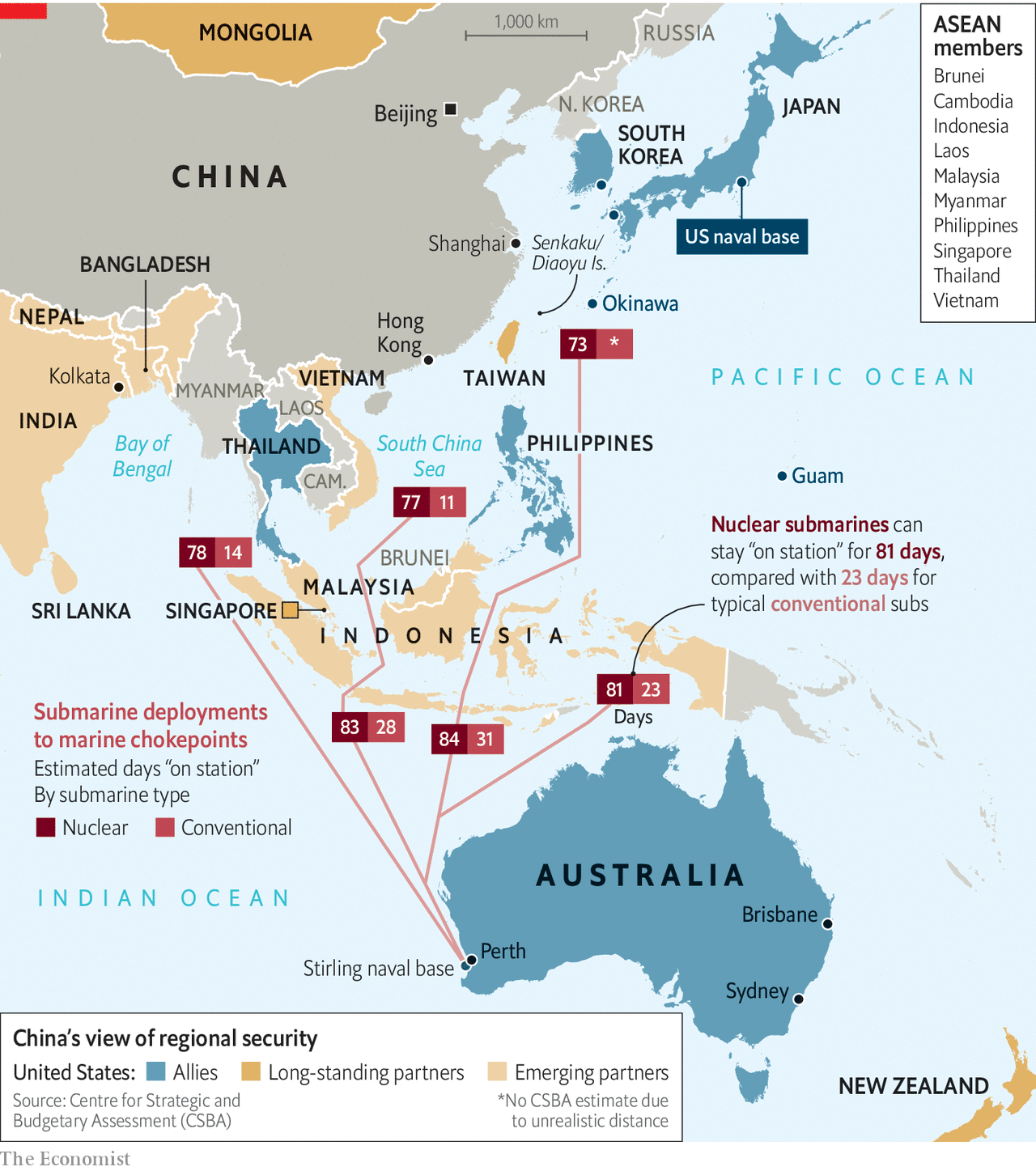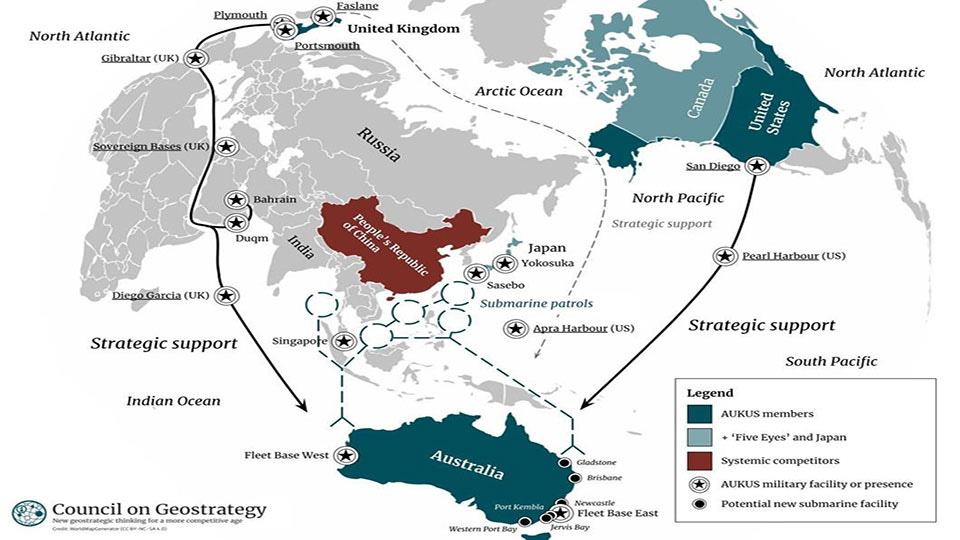GEOECONOMICS in GEOPOLITICS #20
American imperialism; military bases; Palestine-Israel; Middle East peace process; NATO East
Military Bases - Empire Building in Hegemonic Hubris is one of my mini-essay commentaries on TWTW.
Enjoy your weekends’ readings 📚
When America finally ends a disastrous 20-year war, not only turns Afghanistan into a narco-state, but also contributed one million more Afghan refugees.
Afghans’ families trying to get into Hamid Karzai International Airport in Kabul, Afghanistan, on August 16, 2021.
Indeed,
“US-led wars have displaced 37m people. America should accept responsibility," The Guardian, 18th. September, 2020; Foreign Policy in Focus, 23rd. September, 2020.
On the Indian Ocean, for almost 50 years, these people have lived in exile, pleading to return to their homeland. They are the Chagossians on the Chagos Archipelago.
In a 1966 deal, the Pentagon agreed to secretly transfer $14 million to Britain in exchange for the right to build a base on Diego Garcia. The Navy began base construction in 1971. The British officials and Navy personnel rounded up the people’s pet dogs, locked them in sealed sheds, and then gassed them and burned their carcasses. Chagossians watched in horror.
The Chagossians were deported to the western Indian Ocean islands of Mauritius and the Seychelles - 1,200 miles from their homeland - and lived there since (huffpost, 2014).
It is from Diego Garcia that B52 bombers flew their multiple raids into Iraq and Afghanistan; and, campaigns against the Islamic State in Syria and Iraq.
It is also in Diego Garcia that some CIA “renditions” were conducted as was in Guantanamo with the water-torture technique, (Tom Dispatch).
In totality, the United States of America should directly be responsible for the deaths of more than twenty-five million people in wars (David Smith)
New York: Monthly Review Press, 2023], 208–9, 256–57).
when, with U.S. interventions leading to the overthrow of popular governments, as in Iran, Guatemala, the Congo, Libya or wholesale wars in Vietnam, Iraq, and then Afghanistan in naked displays of imperialism on the relentless pursuit in global domination, (Foster, 2006).
That exertion, and execution, in maintaining and sustaining hegemonic control can only arise with the ownership and deployment of:
2] MILITARY BASES where the U.S. has at least 750 U.S. overseas base sites in 80 foreign countries and colonies:
The American history of wars since 1776 points to a fact that when military bases are occupying foreign lands, they are specifically offensive in nature. They are designed to threaten nations, to deploy military force against countries, and to wage offensive casualties upon the populace. An United States Army Research had indicated that since the 1950s, any U.S. military presence abroad is often correlated with U.S. forces initiating military conflicts, that is, a close relationship between establishing military bases outside the United States and the emergence and incidence of wars in other countries.
3] PALESTINIAN-ISRAELI PEACE PROCESS
According to many analysts, it is likely Beijing shall have the potentiality to become the new starting point for future Palestinian-Israeli peace mediation process.
After the new Israeli government came to power, and although the Palestinians and Israel have not engaged in any big or major confrontation, however the continous friction or constant minor street-level type of conflicts seem that prospects for peace talks between them would likely be increasingly bleak.
Then, US Secretary of State Blinken paid a visit to Saudi Arabia. Some analysts had predicted that Blinken's call would put pressure on Saudi Arabia to normalize relations with Israel. The reality is that the Saudis did not comply 照办.
From the various reports, though the normalizing Saudi-Israeli relations would bring significant benefits to the region, but if the Palestinians do not see a path to peace, then any benefits of normalization with Israel would be "limited."
Under this circumstance, it is envisaged that China's recent actions demonstrate the country's willingness to play an active role in mediating peace and facilitating talks 劝和促谈 between Israel and Palestine, (see Bhadrakumar, China steps up, a new era.)
For once, the regional landscape has shifted dramatically in the last six years. This change is primarily the result of both internal and external forces.
To remember that the US's all-powerful hand was still looming over - 手遮天 - the Middle East six years ago. The region has been in a state of unipolarity 单极主导的局面 since the fall of the Soviet Union in 1991 when America became the world's sole superpower. Now, however, this situation, which has persisted for more than 30 years, is changing.
Secondly, Arab countries such as Iran and Saudi Arabia have clearly demonstrated in recent years a greater sense of autonomy.
Thirdly, China has advocated for the joint development of the Belt and Road Initiative (BRI), thereby providing more opportunities for regional economic development.
In January 2020, then-President Trump unveiled his "new peace plan for the Middle East" [Peace to Prosperity], claiming it would be a "win-win" for both Israel and the Palestinians. The truth of the matter is that the plan was completely biased in favor of Israel and amounted to a reversal of the "two-state solution", that is, for a Palestinian State to exist side-by-side in lasting peace with Israel.
Further, the US repeatedly prevented the Security Council from issuing a statement in 2021 to mediate the Israeli-Palestinian conflict.
Thus, contrasting to the United States, which has been biased in favour of Israel and has not played a significant role in promoting the Israeli-Palestinian peace process, China has been relentless in its efforts to resolve the Middle East conflict.
Under the mediation of China, long-time adversaries Iran and Saudi Arabia announced in March in Beijing that they would restore diplomatic relations. At the same time, Zhai Jun, Special Envoy of the Chinese Government on the Middle East, visited Israel and met with the country's foreign minister to discuss the Palestinian issue. He then traveled to Palestine, where his delegation met with Abbas at the presidential palace [the Mukataa in Ramallah].
This meeting was Zhai Jun's third visit to Palestine and Israel in two years, and the Palestinian issue has always been the core of the bilateral discussions.
Duly, too, recent improvement in Saudi-Iranian relations has also triggered a "wave of reconciliation" throughout the Middle East.
The Palestinian-Israeli peace talks have been stalled since 2014 due to issues such as Jewish settlements. For any mediation to progress forward, definitely this would be a primier priority to restart the Palestinian-Israeli peace process and to begin promoting negotiations between the two states.
In the posted article, some of the existential issues, and the underlying problems, are presented, assessed upon, and delivered by Middle East professor Li Weijian - the executive director of the Chinese Association for Middle East Studies (CAMES) and a senior fellow at the Shanghai Institutes for International Studies (SIIS).
A related reading is csloh.substack, China and the Middle East
4] DECLINING U.S. INFLUENCE in MIDDLE EAST
A cursory review on recent events cannot but agreed that US influence in the Middle East is waning. Coupled with tensions flaring across many geopolitical regions and geoeconomic spheres, besides domestic social issues that, as a country, she is unable to administer nor manage well in recent years, USA is on the decline.
That the long-term relationships the US has had with some countries in the Middle East region have seldom been anything other than fraught with consequence implications.
One can mention relationship as those with Iran and Syria. The former country whence the US pulled out of a landmark nuclear deal, and the continual civil war raging for more than a decade with US and US-allied forces occupying one-third of the latter country.
To this day, the hostilities of some other members of the Middle East against the continued US presence remain undiminished.
However, times are changing.
In March, 2023, China brokered a historic peace agreement between Saudi Arabia and Iran, which fast-tracked a crucial cessation of hostilities in Yemen between Saudi-led allies and the Houthi rebels.
Then, Russia played a similarly crucial role in restoring ties between Saudi Arabia and Syria, which has helped pave the way for Damascus’s return after 12 years to the important Arab League alliance of regional states, (see Stimson,30/03/2023).
Such an unprecedented outbreak of peace across perhaps the most historically volatile and war-torn part of the world is now seemingly providing its constituents with a sense of hope and optimism rarely observed in recent years.
At the same time, these monumental events have done much to raise questions regarding the United States’ overall contributions to peace and stability— or lack thereof —in the region, (see CSIS 2020, America failed strategy in Middle East).
A Gallup poll of residents of 13 Muslim-majority nations published on April 7, 2023 clearly shoutout that most “do not view the US as serious about encouraging the development of democracy in the region".
Indeed a large portion of 72 percent doubt the US’ geopolitical intentions. In all, the poll’s respondents were just sceptical that the US would allow people in their region to fashion their own political futures.
More evidence of the US’ waning Middle East influence can be discerned in the recent decisions taken by the Organization of the Petroleum Exporting Countries + (OPEC+) to cut crude-oil output dramatically, first by a mighty 2 million barrels per day (bpd) in October 2022 and then by 1.16 million bpd in early April 2023, (reuters, aljazeera).
This recent OPEC+ strategy has been widely perceived as a direct rebuke to the US geostrategic posture amidst an environment of sharply deteriorating geopolitical relations.
Further evidence of this frayed relationship can be found in the No Oil Producing and Exporting Cartels Act (NOPEC) legislation that was reintroduced in the U.S. Congress in March. The NOPEC would enable the US government to sue OPEC members for energy-market manipulation and antitrust violations and even facilitate the seizures of OPEC assets in US,(see Congress s.997).
From a Geoeconomics perspective, encompassing financial, diplomatic, military approaches, geopolitical situations aren't going to change much in the short term or the long term.
Indeed, if fewer transactions are conducted in US dollars and should there be a dwindling recycling of dollar surpluses into the US Treasuries, the ‘exorbitant privilège’ that the dollar once held as the international reserve currency could be under further assault, (Wilson Centre, 1/05/2023).
Previously, the US can rely upon staunch allies like Israel, Kuwait, Jordan and the UAE, but now that the Middle East and North Africa (MENA) region looking more towards the East to secure its economic and political futures, US influence is far from what it used to be.
The conversation continues with an
analysis on the dynamic MENA state of nations by the former Ambassador Liu Baolai with his experienced view.
Whereas AUKUS's NATO Asia is profoundly misgiving ensuing unease anxiety in southeast Asia, NATO looking East is even more dastardly disturbing.
Not only would AUKUS not ensure Australia's territory integrity, AUKUS would instead expand US military footprint in Australia, Responsible Statecraft, September 20, 2021, and onto the Asia-Pacific Basin, too.
Of similar respect, NATO, as a regional military entity entrusted to look along and after the shores of an Atlantic environment, is meddling in affairs far beyond its borders, and creating much undue confrontation and conflicts. This surely and fully exposes NATO's hypocrisy and its ambition of seeking expansion and hegemony beyond its shoreline.
In 2021, NATO, the core military alliance of the Global North, already accounted for 55.8% of global military spending, (socialist action, July 2023).
The NATO military alliance has no business in Asia, and it should just desist from propagating the so-called China threat, especially this Atlantic-created entity's ambitions are simply a delusion of grandeur (Alex Lo); see Richard Wolff, The fatal contradictions of China-bashing.
European countries like France prefer to pursue their own strategies on the Asia-Pacific rather than blindly following US dictums, and they view a NATO military presence in the Asia-Pacific as encroaching on their own strategies and compromising Europe's Strategic Autonomy, as they will be forced to follow the US regime's requisites in the region.
Li Haidong, a professor at the China Foreign Affairs University, further expressed that NATO's relations with China will be determined by the state of China-US relations because the Atlantic alliance is led and deeply controlled by Washington.
The London Guardian had noted as early as January 10, 2002, that the base at Manas in Kyrgyzstan, where U.S. planes are landing daily, “is 250 miles from the western Chinese border. With U.S. bases to the east in Japan, to the south in South Korea, and Washington’s military support for Taiwan, China may feel encircled.”
Amanda Yee, Containment and the New Cold War on China, Libeŕátion 3/04/2023.
Further, it seems that NATO is suffering from a bout of political psychopathology when NATO Secretary General Jens Stoltenberg at the 2023 NATO Summit in Vilnius said “that what is happening in Ukraine today could occur in Asia tomorrow.”
What is happening in Ukraine does not have to occur in Asia unless NATO and the US hegemon succeeds in provoking a war over Taiwan, (Teow Loon Ti, July 2023).
In which case, the instigation of wars by proxy means and their negative connotations and respective impacts are well expressed by proxy-war adherents like Jeffrey Sachs, Chris Hedges, Andrew Bacevich, Geoffrey Roberts and Tim Beal in their various articulated presentations.
Even Singapore, the US’s closest ally in southeast Asia, has begun to differ. Foreign Minister Vivian Balakrishnan told reporters ahead of the ASEAN Regional Forum in Jakarta that the ASEAN countries do not want to be divided or become vassal states, “or worse, an arena for proxy wars”, (M.K. Bhadrakumar).
On a similar page, New Zealand Prime Minister Chris Hipkins had expressed:
“China’s rise and how it seeks to exert that influence is also a major driver of the increasing strategic competition, particularly in our wider home region, the Indo-Pacific. Our region is becoming more contested, less predictable, and less secure. And that poses challenges for small countries like New Zealand that are reliant on the stability and predictability of international rules for our prosperity and security.” (New Zealand PM calls for deepening economic, environmental cooperation with China, China Daily).
Emerging situations in the Asia-Pacific region, and existential events evolving globally:
MOMENTUM #156
FRIDAY FILES 21st July 2023
Kindly distribute this journal among peers and diaspora communities.
Salutè with solidarity.



